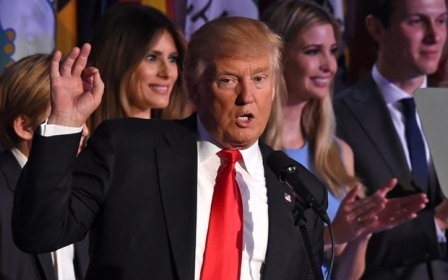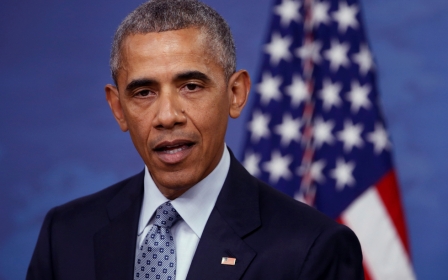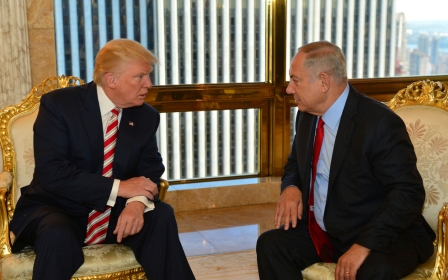Obama's legacy: Between caution, achievement and failure
NEW YORK, United States – It is easy to criticise a man who wins office by promising to exit Afghanistan and Iraq and shutter the militant lockup at Guantanamo Bay – and who ultimately fails to deliver any of those targets during eight years in the White House.
While US President Barack Obama has scaled back deployments in those mostly-Muslim nations, and transferred dozens of detainees from the Cuban gulag, these undelivered promises can only serve to tarnish his legacy.
Obama will likely downplay his shortcomings when addressing Chicagoans on Tuesday, saying adieu to an electorate that made history by choosing a black man to run the world’s richest and most powerful nation in 2008, and again in 2012.
At his best, Obama was a rousing orator who tamed American belligerence and extended a hand of friendship to foes to achieve previously improbable goals: a nuclear deal with Iranian mullahs and détente with Cuban leftists.
At his worst, his diplomacy never matched his pontificating at the podium. Obama’s dithering on Syria hurt America’s stature and spurred chaos and death, even as the body bags from his global anti-terror drone hits piled up.
'His foreign policy was one of excessive caution and an unwillingness to take risks'
- Jonathan Cristol, fellow at the World Policy Institute
“Historians will note that Obama leaves office without having fulfilled his promise to end the Iraq war or to win the Afghanistan war. Those are two black marks,” Andrew Bacevich, a Boston University scholar and author of Washington Rules, told Middle East Eye.
“Historians will have to wait and see how other Obama initiatives like the Paris climate agreement and the Iran nuclear deal pan out before rendering any conclusive judgments. An honest assessment of Obama’s legacy has to be that it’s too soon to tell.”
Obama worked hard to restore unity between Washington and its allies after President George W Bush’s divisive tenure and avoided adding to his predecessor’s so-called “War on Terror” with more big US military deployments abroad.
‘Don’t do stupid stuff’
The 44th president and his aides called his approach: “Don’t do stupid stuff” – a term that captures Obama’s basic caution about one superpower’s ability to shape world events, halt bloodshed and expand democratic rule.
Once in office, Obama told America’s foes he would “extend a hand”. This outreach yielded a historic breakthrough with Iran, in which the US lifted oil, trade and economic sanctions in return for stringent new curbs on its nuclear programme.
Hardliners warn that the threat of Iranian atomic weapons remains. Many of the restrictions on Tehran start expiring next decade, allowing the Islamic Republic to edge toward weapons capacity again.
In Cuba, restoring diplomatic relations led to a US Embassy in Havana and greater economic ties, but gains there have not been met with big releases of political prisoners or democratic reforms from its communist elite.
Last year’s global climate change pact commits the world to reducing the greenhouse gas emissions blamed for rising temperatures and sea levels, worsening droughts and heat waves. China can keep expanding its emissions until 2030.
While Obama scored a public relations victory by deploying the Navy Seals who killed al-Qaeda boss Osama bin Laden at his compound in Pakistan in 2011, much of his presidency was marked by disappointment.
He never achieved complete pull-outs from Afghanistan, which may collapse into chaos without US support, or Iraq, where the blitzkrieg arrival of the Islamic State (IS) group in 2014 necessitated a speedy American redeployment.
Obama’s efforts to shutter the detention facility at Guantanamo Bay, Cuba, were thwarted by the US Congress, which blocked him from moving the alleged 9/11 plotters and other terrorism suspects onto US soil.
The administration was caught off guard by the Arab Spring in 2011. It initially championed the protestors’ efforts to oust autocrats, but a military coup in Egypt and the Houthi rebellion in Yemen saw Washington turned back to the elites it had abandoned.
When Russia annexed Ukraine’s Crimean peninsula in 2014 and backed rebels in eastern Ukraine, Obama levied sanctions. They have had little effect on Moscow’s calculus and Russia has not retreated.
Obama’s answer to China’s rising clout was a “pivot to Asia,” but he was never able to take his eyes off Europe and the Middle East. After Washington accused Beijing of a land grab in the South China Sea, all Obama could do was object.
Syria’s red line
The outgoing president is most often attacked for not enforcing his own “red line” against the government of Syrian President Bashar al-Assad for using chemical weapons in its war against a dizzying array of rebel groups.
Obama then backed down from his threat to respond with force. His claim that Assad’s “days are numbered” grew ever-more absurd as, backed by Russia and Iran, the despot gradually won the upper hand in a war that has claimed some 400,000 lives.
'The Pentagon is still committed to maintaining full spectrum dominance around the world, with the US prevailing in every level of combat in every region of the globe'
- Michael Brenner, scholar
“His foreign policy was one of excessive caution and an unwillingness to take risks, knowing that – after wars in Iraq and Afghanistan – the American public had no appetite for more overseas ventures,” Jonathan Cristol, a fellow at the World Policy Institute, a think tank, told MEE.
“Instead, we saw Obama’s strategic patience rolled out in many scenarios. When it came to North Korea, we were patient. And what happened? Pyongyang moved forward developing nuclear weapons and ballistic missile technology.”
Broadly, more than half of those polled last year across parts of Europe, the Asia-Pacific and North America gave Obama the thumbs up, according to Pew Research Center. His job approval rating of about 54 percent among Americans is favourable.
But there are also signs of discontent. At a debate hosted by Intelligence Squared US in November, an audience of typically liberal New Yorkers voted for the motion that, on balance, Obama’s foreign policy had been a failure.
Obama’s aides vaunt his personal story – that the son of a Kenyan who spent part of his childhood in Indonesia and had “Hussein” as a middle name embodied the spirit of an outward-looking generation that eyed US military intervention suspiciously.
“He promised to abolish nuclear weapons and reach out the hand of friendship and win over America’s adversaries,” Michael Mandelbaum, a scholar and author of Mission Failure: America and the World in the Post-Cold War Era, told MEE.
“He came in with the idea that his mere presence would improve America’s standing in the world. He hasn’t improved America's standing in the eyes of other countries. His reluctance to use force has, if it hasn’t emboldened, it certainly hasn’t discouraged Russia, China and Iran.”
And while most critics accuse Obama of an abundance of caution, others say he did not go far enough to tackle the military and political ideology underpinning Washington’s super sized and untrammelled role in world affairs.
“You’re not retrenching when you have this vast network of military bases in far-flung parts of the world,” Michael Brenner, a Pittsburgh University scholar and former US Defense Department consultant, told MEE.
“The Pentagon is still committed to maintaining full spectrum dominance around the world, with the US prevailing in every level of combat in every region of the globe. That’s not retrenchment.”
This article is available in French on Middle East Eye French edition.
New MEE newsletter: Jerusalem Dispatch
Sign up to get the latest insights and analysis on Israel-Palestine, alongside Turkey Unpacked and other MEE newsletters
Middle East Eye delivers independent and unrivalled coverage and analysis of the Middle East, North Africa and beyond. To learn more about republishing this content and the associated fees, please fill out this form. More about MEE can be found here.




